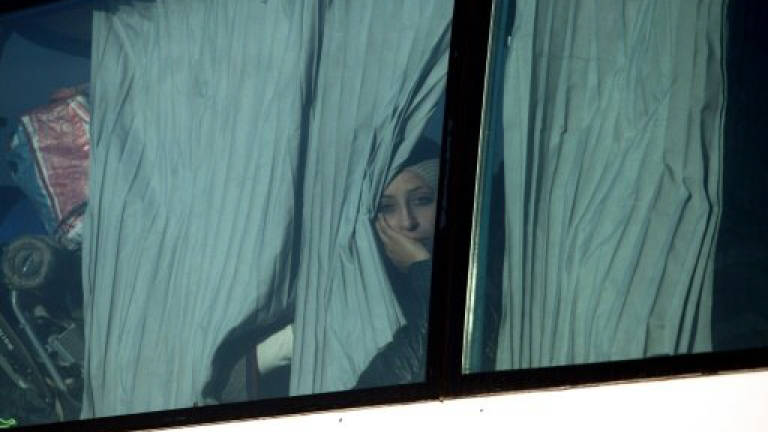Greece starts evacuating squalid Idomeni migrant camp

IDOMENI, Greece: Hundreds of Greek police on Tuesday began clearing the squalid Idomeni camp, a migrant flashpoint on the Macedonia border where thousands of people have been camped out for more than three months.
The overcrowded camp packed with desperate refugees and migrants has become a potent symbol of the human suffering and chaos as Europe struggles to cope with its worst migrant crisis since World War II.
In an operation which began shortly after sunrise, hundreds of Greek police began evacuating the sprawling camp which is currently home to 8,400 refugees and migrants, among them many families with children, an AFP correspondent said.
At its height, there were more than 12,000 people crammed into the site, many of them fleeing war, persecution and poverty in the Middle East and Asia, with the camp exploding in size since Balkan states began closing their borders in mid February in a bid to stem the human tide seeking passage to northern Europe.
A helicopter hovered overhead as the operation got under way, with police sources saying at least 700 officers were involved in the evacuation which aims to clear the camp and take the people to reception centres and camps dotted around the country.
The move comes after a brutal winter of freezing rain and mud which saw many people trying to force their way across the border, sometimes resulting in a violent standoff with the Macedonian police.
But officials said Tuesday's operation was proceeding calmly in the flashpoint camp, which has often been the scene of angry confrontations with the security forces.
"The operation began on Tuesday around 8.40am (Malaysian time) and is taking place slowly and in a calm atmosphere. There has not been any need to use force," Yiorgos Kyritsis, the government's migration spokesman, told AFP.
A 10-day process
On Monday, Kyritsis said the operation to clear all 8,400 people living there would take at least 10 days.
Officials have said 6,000 spots are available at reception centres, and that most of the migrants are to be moved to camps at former industrial facilities near Greece's second city Thessaloniki, which lies about 80 km to the south.
No force was used as officers, who started to arrive at the camp Monday, urged people to leave their tents and board buses waiting nearby to transfer them to reception centres.
Four buses with around 400 people on board could be seen leaving the site early Tuesday, an AFP correspondent said.
Journalists were unable to enter the camp itself on Tuesday morning with police keeping them out of the site, added the correspondent on the ground.
Many of the camp's residents are women and children keen to be reunited with male relatives who have pushed ahead on their own – with the aid of smugglers – hoping to find a place of refuge in EU states more financially viable than debt-hit Greece.
The leftist government of Greek Prime Minister Alexis Tsipras has for months been trying to persuade migrants to move away from makeshift tent encampments at Idomeni and at the port of Piraeus for their own comfort and safety.
Over the past two weeks, Greek officials have managed to convince some 2,500 people to leave Idomeni, while the number at Piraeus was brought down from around 5,000 people in March to 1,500.
But many are wary of relocating to organised camps away from the border or the city of Athens, because it could be harder to find people-smuggling contacts.
There are over 54,000 migrants stranded in Greece, according to government estimates.
2,000 rescued off Libya
Meanwhile, around 2,000 migrants seeking to reach Europe from Africa were plucked to safety from unseaworthy boats in the Mediterranean in 15 operations off the coast of Libya on Monday, the Italian coastguard service said.
Two Italian naval vessels rescued more than 500 people while two Doctors Without Borders (MSF) boats took another 788 migrants.
An Irish navy boat rescued hundreds more as did a passing cargo ship, according to the coastguard.
So far this year, the International Organization for Migration says an estimated 190,000 migrants and refugees have entered Europe by sea, arriving in Italy, Greece, Cyprus and Spain. Another 1,359 have died en route. — AFP